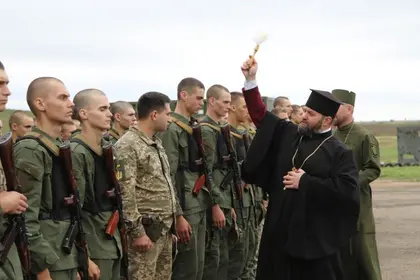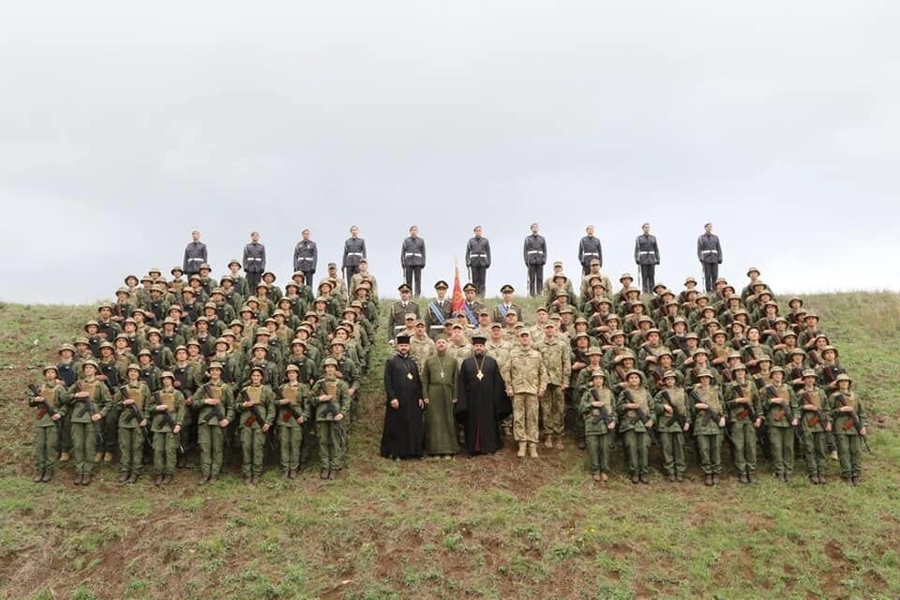Over the course of nearly two years of full-scale war, we have seen images of extreme pain and joy – from the funerals of those fallen in battle to the marriages of Ukrainian soldiers. In all these moments there is a priest present to celebrate the sacraments. Wartime, more than peace, highlights the importance of the solace that religion can give. We asked the Archbishop of Odesa and the Baltic, Athanasius, about his personal experience with the soldiers.
War tragically raises our awareness of death and obliges us to ponder the meaning of life. What answer does the Orthodox Church give to the personal suffering of soldiers in battle and their families who suffer in grief?
JOIN US ON TELEGRAM
Follow our coverage of the war on the @Kyivpost_official.
It is very difficult to comment and answer questions of this kind, because the Ukrainian Church has never faced the realities of war. In many ways, our Church has been facing something new and unknown. For example, since the beginning of military operations in Ukraine, since 2014, priests have come to the aid of our soldiers in the trenches, who spiritually and prayerfully began to support our Ukrainian soldiers in the trenches on the front line. Soldiers who saw volunteer priests near them found the strength to overcome depressive states, began to believe in God and become practicing Christians. As the managing bishop in the Luhansk region (2013-2021), I was a volunteer chaplain for three years in various units based in the region. And from my own experience I saw how the Ukrainian warrior changed.

Ukraine Forces Undergo Nuclear Forensics Training at US Laboratory
I administered the sacrament of baptism and anointing, the sacrament of marriage, confession, and holy communion many times. This is one side of helping the military. The other side is to be a spiritual warrior – that is, a psychologist. In reality, the serviceman, unfortunately, did not trust the staff psychologists and could not fully open up to him. They believed that a psychologist can tell the commander, can easily violate medical secrecy, but the priest is bound by the vow of silence of the sacrament of confession and will definitely not tell anyone anything.
To date, the Orthodox Church of Ukraine has developed certain criteria for helping military personnel and their families. In our Odesa diocese, seminars are often held in which church abbots learn how to work with soldiers who went through the crucible of war and returned home morally killed and maimed. And the task of the priest in the parish is to first assess the state of the soldier and his family. The shepherd needs to check whether the person is safe, because when experiencing stress, the warrior may not be able to cope with the factors that expose him to danger.
At the second stage, the priest should hold a series of meetings, during which he should determine how the person lived before the crisis, how he overcame difficulties, what support resources he has (such as family and friends). At the third stage, the priest, together with the person, should review what has been achieved and what should still be achieved. It is also worth emphasizing that each stage of the crisis can contribute to spiritual growth. With the correct experience of the crisis, it is never possible to return to the state that existed before the crisis, because a person has gained new experience.
In addition, at some temples, where possible, centers for spiritual rehabilitation and assistance to military personnel have begun to operate, in which not only priests, but also psychologists, and in some cases even psychiatrists, are involved in helping soldiers.
The Orthodox Church of Ukraine constantly emphasizes that we are ready to accept anyone who comes to us for help, we will accept anyone who wants to be with us
What contribution can the Orthodox Church of Ukraine make in achieving peace, and above all in further reconciliation between the Russians and the Ukrainians who are currently at war?
Christ said the following words in the Holy Gospel: “By this everyone will know that you are My disciples, if you have love among yourselves.” The Orthodox Church of Ukraine, in particular the Head of the Church, Metropolitan Epiphany, constantly emphasizes that we are ready to accept anyone who comes to us for help, we will accept anyone who wants to be with us. Following Christ, we cannot have hatred in our hearts. In the end, we have the example of Christ the Savior, who on the cross asked God to forgive the sins of those who crucified him. We cannot be higher than Christ, we must be like the father in the parable of the prodigal son. After all, the following words are said in the Lord’s prayer: “and forgive us our trespasses, as we forgive those who trespass against us...”
Therefore, if we do not forgive, then God will not forgive us either. That is why I always emphasize to the priests entrusted to me that they should preach in their churches about love, about forgiveness, about the fact that one cannot hate one’s enemies, that is not what Christ taught us. In the end, the Lord will judge us by the way we treated our neighbors, including our enemies. “What you did to the least of your brothers, you did to me,” says the Lord.
That is why we have never had and will never have hatred for Russians. We did not attack, but were attacked. We are not the ones who kill civilians, rape children in front of their parents, we are not the ones who shoot those who have surrendered. The Russians do that. Therefore, first of all, those who have caused harm should reconcile, and we are always ready to forgive ordinary people. And as for criminals, let them be judged by the law of Ukraine and the law of the European Union.
What role do Ukrainian churches play in the spiritual and humanitarian support of local communities and, in particular, families resettled from the war zone or killed in the fighting?
Since 2014, our Church has opened a new page for itself – social assistance to the needy. Thus, the Department of Social Service and Charity Management operates on the basis of the Kyiv Metropolis. A public organization Eleos-Ukraine was opened on the basis of this department. Therefore, since 2014, many social projects to help military personnel, forced migrants and military personnel have been implemented throughout Ukraine through this organization. The Odesa Diocese is also a member of this organization and helps the needy. In addition, they contact me from other countries and send help; we, in turn, pass it on to those who need it most.
I myself sometimes get behind the wheel of a truck and go to Romania or some other European country and transport loads of humanitarian aid. We also shipped many tons of aid to the big hub in Dnipro, which was created by Metropolitan Serhiy of Donetsk. Since the beginning of Russia’s full-scale invasion of Ukraine, this hub has been receiving the forcibly displaced people from the Donetsk, Luhansk, Kharkiv, Kherson and Mykolaiv regions. Our Odesa Diocese has also put a lot of effort into helping the parishes of the region in their constant work of spiritual support and humanitarian aid.
You can also highlight the text and press Ctrl + Enter







